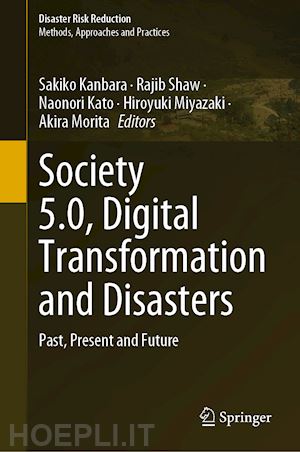
Questo prodotto usufruisce delle SPEDIZIONI GRATIS
selezionando l'opzione Corriere Veloce in fase di ordine.
Pagabile anche con Carta della cultura giovani e del merito, 18App Bonus Cultura e Carta del Docente
This book presents the evolution of the science technology paradigm in Japan and analyzes the critical community and local governance issues from the perspectives of the changing risk landscape, Society 5.0, and digital transformation. It also provides suggestions for the future development of a resilient society and community, by drawing lessons from other countries.
Advancements in science technology in recent decades in Japan and the world might have increased our capacity to tackle the adverse human consequences of various kinds of disasters and environmental issues. However, the accompanied and interlinking phenomena of urbanization, climate change, rural to urban migration, population decreases, and aged population have posed new challenges, especially in the small, medium-sized cities, and in rural areas of Japan. This is also enhanced by the risk of cascading, complex and systemic risk, which is defining a new normal as “living with uncertainties”.Japan may have unique disadvantages compared with other countries. Trying to drive digitization without thoroughly understanding these disadvantages and addressing them head-on will only lead to failed digital transformations.
With these three pillars of changing risk landscape, Society 5.0, and Digital transformation drive, the book will analyze the evolution of the science technology paradigm in Japan, will go deeper into the critical community and local governance issues, and will provide suggestions for future development of resilient society and community, by drawing lessons from overseas disaster risk reduction.
Science technology and People centered society.- Science, Technology, Innovation and Sendai Framework for Disaster Risk Reduction.- Systemic risk and system-based approach for Society 5.0.- Emerging issues and Japan’s milestones in science and technology in disaster risk reduction.- Evidence Based Policy Making of Smart City: The Case of Challenge in Maebashi City, Japan.- Personal life records for health decision making in disaster situation.- Digital transformation and disaster risk reduction.- xR and implications to DRR: challenges and prospects.- Open governance and disaster risk reduction.- Open Governance and Disaster Planning, Recovery, and Response: Lessons from the USA.- Technology landscape in post COVID-19 era: Example from China.- Jugaad innovation: concept and lessons of social innovation in India.- Towards a People centric technology driven society.











Il sito utilizza cookie ed altri strumenti di tracciamento che raccolgono informazioni dal dispositivo dell’utente. Oltre ai cookie tecnici ed analitici aggregati, strettamente necessari per il funzionamento di questo sito web, previo consenso dell’utente possono essere installati cookie di profilazione e marketing e cookie dei social media. Cliccando su “Accetto tutti i cookie” saranno attivate tutte le categorie di cookie. Per accettare solo deterninate categorie di cookie, cliccare invece su “Impostazioni cookie”. Chiudendo il banner o continuando a navigare saranno installati solo cookie tecnici. Per maggiori dettagli, consultare la Cookie Policy.